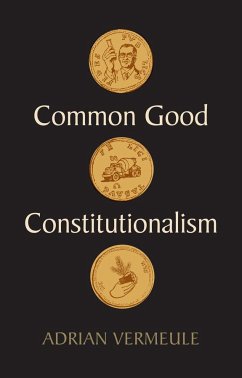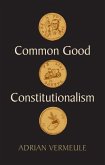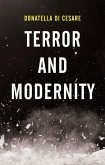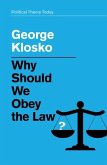The way that Americans understand their Constitution and wider legal tradition has been dominated in recent decades by two exhausted approaches: the originalism of conservatives and the "living constitutionalism" of progressives. Is it time to look for an alternative?
Adrian Vermeule argues that the alternative has been there, buried in the American legal tradition, all along. He shows that US law was, from the founding, subsumed within the broad framework of the classical legal tradition, which conceives law as "a reasoned ordering to the common good." In this view, law's purpose is to promote the goods a flourishing political community requires: justice, peace, prosperity, and morality. He shows how this legacy has been lost, despite still being implicit within American public law, and convincingly argues for its recovery in the form of "common good constitutionalism."
This erudite and brilliantly original book is a vital intervention in America's most significant contemporary legal debate while also being an enduring account of the true nature of law that will resonate for decades with scholars and students.
Adrian Vermeule argues that the alternative has been there, buried in the American legal tradition, all along. He shows that US law was, from the founding, subsumed within the broad framework of the classical legal tradition, which conceives law as "a reasoned ordering to the common good." In this view, law's purpose is to promote the goods a flourishing political community requires: justice, peace, prosperity, and morality. He shows how this legacy has been lost, despite still being implicit within American public law, and convincingly argues for its recovery in the form of "common good constitutionalism."
This erudite and brilliantly original book is a vital intervention in America's most significant contemporary legal debate while also being an enduring account of the true nature of law that will resonate for decades with scholars and students.
"Elegant, insightful, magisterial: Adrian Vermeule has written an instant classic of scholarship, exposing the poverty of today's prevailing legal theories, left and right, and pointing us to a better alternative - one as vibrant and radical as the Western tradition."
Sohrab Ahmari, bestselling author of The Unbroken Thread and From Fire, by Water
"This is the most important book of American constitutional theory in many decades. Common Good Constitutionalism is a bolt from the blue that challenges conservative and progressive constitutional law paradigms alike. It is destined to infuriate, and to reorient."
Jack Goldsmith, Learned Hand Professor of Law, Harvard University
"You are holding that rarest of books, one that will change minds, change the terms of debate, and change the future. Adrian Vermeule has written the most important and original book on constitutional theory for this generation. Future scholars, lawyers, and citizens will look back at this book for having sounded the death knell of the seemingly unassailable camps of conservative 'originalism' and progressive 'living constitutionalism,' revealing them to be exhausted sides of the same devalued liberal coin. More importantly, this book charts a new and better path - a common good constitutionalism grounded in the classical tradition but repurposed for the revitalization of a declining but redeemable republic."
Patrick J. Deneen, University of Notre Dame, author of Why Liberalism Failed
"This bold and provocative book challenges the views on constitutional interpretation of both US conservatives and liberals, and reframes the debate by focusing on a substantive concept: the common good. With his characteristic originality and ability to weave the insights of different disciplines, Vermeule puts forward a thought-provoking account of the common good and its legal implications, one which will be of relevance well beyond American debates. Even those who disagree with it will have much to learn from this erudite engagement with one of the main concepts in political thought."
Francisco J. Urbina, Pontificia Universidad Católica de Chile
"ambitious"
John Lloyd, Times Literary Supplement
Sohrab Ahmari, bestselling author of The Unbroken Thread and From Fire, by Water
"This is the most important book of American constitutional theory in many decades. Common Good Constitutionalism is a bolt from the blue that challenges conservative and progressive constitutional law paradigms alike. It is destined to infuriate, and to reorient."
Jack Goldsmith, Learned Hand Professor of Law, Harvard University
"You are holding that rarest of books, one that will change minds, change the terms of debate, and change the future. Adrian Vermeule has written the most important and original book on constitutional theory for this generation. Future scholars, lawyers, and citizens will look back at this book for having sounded the death knell of the seemingly unassailable camps of conservative 'originalism' and progressive 'living constitutionalism,' revealing them to be exhausted sides of the same devalued liberal coin. More importantly, this book charts a new and better path - a common good constitutionalism grounded in the classical tradition but repurposed for the revitalization of a declining but redeemable republic."
Patrick J. Deneen, University of Notre Dame, author of Why Liberalism Failed
"This bold and provocative book challenges the views on constitutional interpretation of both US conservatives and liberals, and reframes the debate by focusing on a substantive concept: the common good. With his characteristic originality and ability to weave the insights of different disciplines, Vermeule puts forward a thought-provoking account of the common good and its legal implications, one which will be of relevance well beyond American debates. Even those who disagree with it will have much to learn from this erudite engagement with one of the main concepts in political thought."
Francisco J. Urbina, Pontificia Universidad Católica de Chile
"ambitious"
John Lloyd, Times Literary Supplement








